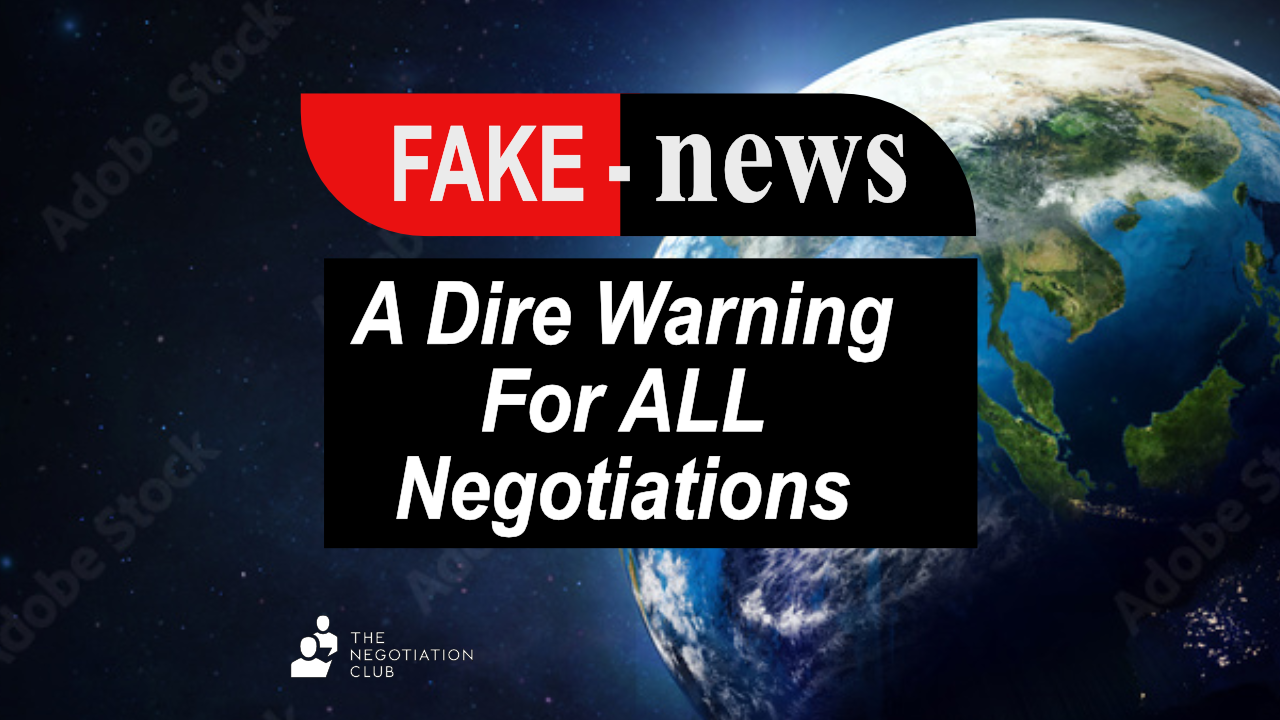
Fake News, Flawed Deals: Why Negotiators Must Challenge the Source of Truth
In today’s information-saturated world, the line between news, commentary, opinion, advertising, and AI-generated content is almost indistinguishable. While this has significant implications for democracy, education, and social trust—it also has very real consequences in negotiation.
Whether you’re buying, selling, sourcing, influencing, or partnering—the decisions you make are only as good as the information you base them on.
So here’s the question we’re raising:
"Should we be licensing the reporting of news and information? Or at the very least, demanding clearer signposts about what is fact, what is opinion, and what has been generated by a machine?"
Let’s break this down from a negotiator’s perspective.
What’s Really Going On?
In the UK (and many parts of the world), there is no legal requirement to be licensed as a journalist. This supports freedom of speech, but it opens the door for:
- Individuals and businesses to pose as news sources
- Social media personalities to broadcast opinions as facts
- AI-generated content to mimic credible reporting
- Deepfakes and synthetic media to distort reality
Even more concerning: many people are now using these unregulated channels as their primary source of “truth.”
....... And in negotiation, truth matters!
Negotiation Relies on Trustworthy Information
At The Negotiation Club, we always emphasise that:
"Negotiation is a problem-solving process with a twist (each party wants to maximise value.)"
To do that effectively, you need to know:
- What is true?
- What is assumed?
- What is missing?
If you’re preparing a negotiation based on flawed assumptions, misinformation, or unchecked “facts,” your strategy is already compromised.
Here’s where it becomes dangerous:
- A supplier tells you “lead times have doubled globally.”
- A buyer claims “we’ve had better offers from others.”
- A client insists “the market’s down—we simply can’t afford more.”
All of these might be true..... Or they might be misinformation—sometimes deliberate, sometimes accidental.
Tactics to Deal with the ‘Fog of Misinformation’
We don’t just talk about theory—we focus on practice. So how do we teach negotiators to test and verify information?
1. Use Open and Closed Questions Strategically
- Open Questions help uncover information:
“Can you tell me more about the data you’re using to support that claim?”
“How do you see that trend impacting our deal?”
- Closed Questions help verify or challenge a statement:
“So are you saying that applies across all regions, or just the UK?”
“Have you already received that alternative proposal in writing?”
This tactic isn’t just about probing—it’s about building a structured information-unveiling plan. And it should happen:
- Before the negotiation (in preparation)
- During the negotiation (as part of the conversation)
- After the negotiation (as part of review & reflection)
2. Summarise and Clarify
Summarising allows you to take control of the information flow and test how aligned both parties are:
“So what I’m hearing is that you’re concerned about delivery risk, but you’d be open to flexibility if we can demonstrate reliability in month one. Is that correct?”
This not only builds rapport—it prevents false assumptions from festering.
3. Slow Down When It Matters
One of our key tactics at The Negotiation Club is:
The pace of misinformation often creates urgency—“Act now, decide fast, trust us.”
But great negotiators know that slowing down reveals more than speeding up.
Rebuilding Trust in Information—In Society and the Negotiation Room
We don’t need to silence voices or limit freedom to comment.
But perhaps we do need to label content more clearly:
- Journalism ... vs... commentary
- Human ... vs... AI-generated
- Sponsored ... vs... independent
Just as food labels help us make healthier choices, information labels could help us make smarter negotiation decisions.
Don’t Negotiate on Assumptions Alone
Negotiation isn’t just about tactics—it’s about judgement. And your judgement is only as strong as the quality of your questions and the integrity of the information you’re using.
At The Negotiation Club, we help you practise exactly that:
- Challenging vague statements
- Testing data
- Observing when something doesn’t feel right
- Asking the right questions to uncover what matters
If you don’t practise these micro-skills, you risk falling victim to the most dangerous tactic in any negotiation:
“They told me it was true…”
Join Us
Join one of our practice sessions or download our negotiation tactic cards—including cards for:
Practice your skills for FREE!
- Open & Closed Questions
- Summarising
- Pause, Consider, Respond
- Anchoring
- Mirroring
- Closing Accusation
- ....... an many, many more Negotiation Tactics & Techniques
The better you understand information... the better you can negotiate!
About the Author Philip Brown

Phil Brown is the founder of The Negotiation Club, a training organisation built on the belief that negotiation is a skill developed through practice, not theory. With 30 years of procurement and commercial experience, Phil now helps professionals worldwide build confidence and fluency through structured, repeatable negotiation practice. Experience Phils unique negotiation practice at a FREE NEGOTIATION TASTER ....



